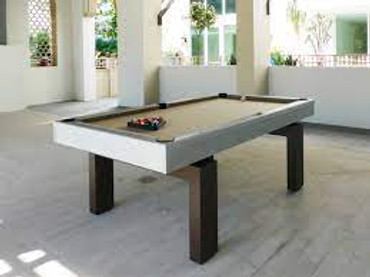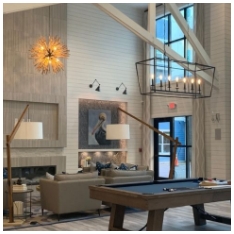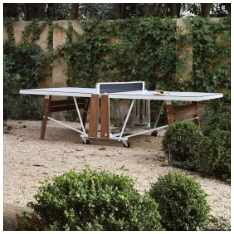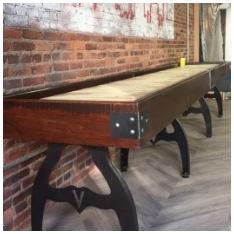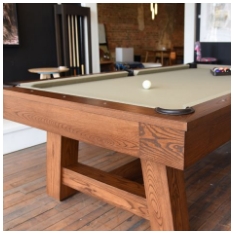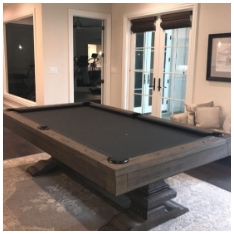Pool tables are available in various designs to match different spaces and usage preferences. If you're considering adding one to your home, it's important to understand the core differences between outdoor and indoor pool tables. These differences go beyond just placement. They involve construction materials, weather resistance, maintenance needs, and even how the game feels when played.
This article explores outdoor pool tables are different from indoor pool tables, helping you decide which is best suited to your space and expectations.
Materials and Construction: Built for Environment
Indoor Pool Table Materials
Indoor pool tables are typically made using hardwood frames and slate playing surfaces. The slate provides a flat, level surface for consistent gameplay. The felt covering is usually wool or a wool-nylon blend, which performs well in controlled environments.
The materials used assume a stable, temperature-controlled setting with low humidity. This makes indoor tables unsuitable for exposure to sun, rain, or extreme temperature changes.
Outdoor Pool Table Materials
Outdoor pool tables, on the other hand, are designed to withstand the elements. Their frames are usually constructed from treated aluminum or stainless steel to prevent rust. The playing surface is often made of weather-resistant materials such as marine-grade plywood or composite resin instead of slate.
The felt used on outdoor tables is typically water-resistant and UV-protected, which prevents fading or damage from moisture and sunlight. This design ensures that outdoor tables can stay outside all year with minimal damage, making them a better fit for patios, backyards, or poolside spaces.

Weather Resistance and Durability
Indoor Tables Are Sensitive to Conditions
Indoor pool tables require a controlled environment to maintain their quality. Excessive humidity can warp the wood frame or cause the felt to loosen. Temperature fluctuations may lead to uneven play over time. Because of this, indoor pool tables are best kept in a game room, basement, or den where conditions remain stable.
Outdoor Tables Handle the Elements
Outdoor tables are engineered to be highly durable. They are waterproof, rust-resistant, and capable of handling exposure to rain, heat, and UV rays. Many models also come with fitted covers to provide additional protection when not in use. Their construction is ideal for open-air settings where controlling the environment is not possible.
If you plan to play year-round or don’t have an indoor space to house your table, an outdoor version will offer a longer-lasting investment.
Performance and Gameplay Experience
Indoor Tables Offer Traditional Play
Since indoor tables are typically made with slate and wool felt, they provide a smooth and consistent ball roll. These materials are standard in professional and tournament settings. The bounce, roll speed, and accuracy are all optimized for serious play.
If you're looking for a traditional playing experience that mimics professional conditions, an indoor table will offer the best performance.

Outdoor Tables Make Compromises for Durability
While outdoor pool tables are built to last, their gameplay can feel slightly different. The non-slate surfaces may not offer the same consistency as slate, and water-resistant felt can be coarser or slightly slower than standard felt.
However, many modern outdoor tables have significantly improved in this regard. High-end models offer nearly identical performance to indoor versions, making them suitable for casual and even semi-competitive play outdoors.
Maintenance Requirements
Caring for Indoor Tables
Indoor tables require regular brushing to remove chalk dust and debris from the felt. The wood frame should be kept away from humidity and wiped down with appropriate cleaners. Because they remain indoors, they are generally easier to maintain over the long term.
Maintenance for Outdoor Tables
Outdoor pool tables are lower maintenance in terms of durability but may require more frequent cleaning. Dust, leaves, pollen, and rain can accumulate on the table surface, especially in open areas. Covers are essential for protecting them when not in use. Periodic cleaning of the metal frame and waterproof felt is recommended to prevent long-term damage.
Installation and Weight Differences
Indoor Table Installation
Indoor tables are often heavier due to the use of solid wood and slate. The slate bed usually comes in one to three pieces and needs precise leveling. Moving an indoor table requires careful planning and, in most cases, professional installation.
Outdoor Table Portability
Outdoor tables are typically lighter and may use one-piece playing surfaces. This makes them easier to move, which is practical for outdoor setups that may need to be rearranged for events or seasonal changes. However, lighter weight can also mean they are more susceptible to movement during play unless secured.
Cost Considerations
Outdoor pool tables often cost more than indoor versions because of the weather-resistant materials and additional features. However, the cost is justified if you plan to place the table in an outdoor space where indoor models would quickly degrade.
Indoor tables, while sometimes less expensive, might require a dedicated space in your home and may come with additional climate control or room modification costs.
Choosing the Right Pool Table for Your Needs
Whether you choose an indoor or outdoor pool table depends entirely on your available space, climate, and how you intend to use the table.
- If you have a dedicated game room and want a traditional playing experience, go with an indoor table.
- If you want to entertain outside or don’t have an indoor space, an outdoor table is the practical choice.
Understanding outdoor pool tables are different from indoor pool tables allows you to make an informed purchase. Evaluate materials, performance, weather resistance, and upkeep to select the best option for your home and lifestyle.
Final Thought:
Making the right decision means investing in a table that matches your environment. Choose wisely based on construction quality, resistance to environmental factors, and gameplay preferences.
